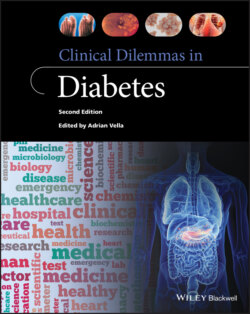Читать книгу Clinical Dilemmas in Diabetes - Группа авторов - Страница 28
Pharmacologic therapy for the prevention or delay of diabetes mellitus
ОглавлениеA systematic review that included 20 randomized controlled trials examined the efficacy of metformin for the prevention or delay of DM [81]. The overall conclusion was that for at‐risk subjects, metformin compared with placebo reduced or delayed the risk of progression to DM. The incidence of DM was not significantly different when comparing metformin plus intensive diet and exercise and identical intensive diet and exercise alone.
In addition to metformin, other medications have proven efficacy in reducing progression to DM. Once‐daily subcutaneous liraglutide 3.0 mg as adjunct therapy to lifestyle modifications reduced progression to DM compared to placebo after 160 weeks [82]. In adults with elevated CVD risk and prediabetes or newly established DM, a once‐daily insulin glargine injection reduced progression to DM compared to placebo [83]. Several thiazolidinediones also have proven efficacy in reducing the progression to DM, including pioglitazone, rosiglitazone, and troglitazone [84–86]. Additionally, combined hormone replacement therapy in post‐menopausal women, glipizide, valsartan, orlistat, and acarbose also significantly reduced the progression to DM compared to placebo [87–92]. Interestingly, during the Study to Prevent Non‐Insulin Dependent Diabetes Mellitus (STOP‐NIDDM), acarbose was associated with a 49% relative risk reduction in cardiovascular events compared to placebo with a HR 0.51 (95% CI 0.28–0.95). However, the methodology of STOP‐NIDDM has been heavily criticized and the validity of the results has been questioned [93]. Many pharmacologic therapies have also been studied and shown to be ineffective in preventing progression to DM, including vitamin D, nateglinide, glimepiride, and ramipril [94–97].
